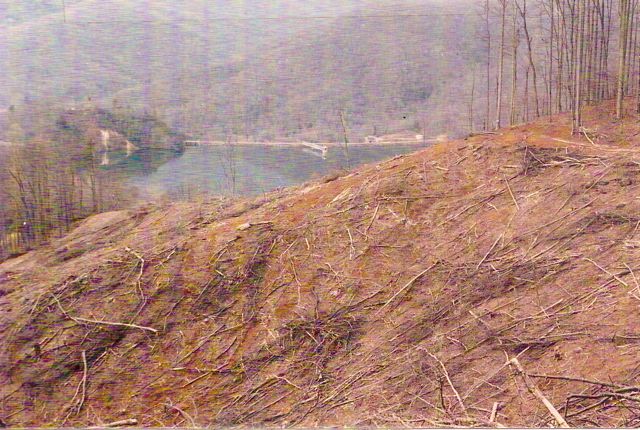
In a March 12 Asheville Citizen-Times article, Rep. Tim Moffitt suggests, “Selective timbering under the auspices of a professional arborist is the best thing for a watershed.” (For more on Moffitt’s remarks, see the ACT article “Moffitt: Asheville Watershed Rules Shouldn’t Be Too Restrictive,” by Clarke Morrison. Xpress file photo of clear-cut logging at the North Fork Reservoir in the late 1980s)
Moffitt chairs the Metropolitan Sewerage/Water System Committee, a statehouse body of five legislators that’s considering stripping the city of Asheville of the water system, creating a new regional authority to own and manage the system, handing it off to the Metropolitan Sewerage District, or leaving things the way they are. From the Mountain Xpress files, here’s a flashback at the controversy over cutting trees in the 21,000-acre North Fork Reservoir watershed.
Dec. 1986: The Asheville-Buncombe Water Authority votes 4-2 to approve clear cutting 51 acres at North Fork. Authority board members Don Williams and Jesse Ledbetter voted against the measure, and a former Watershed Superintendent, Bob Brown, voiced opposition, “pointing out that previous logging in the watershed [1963-1978] had hurt water quality.” (from a history later compiled by Citizens Against Clearcutting in the Asheville Watershed)
1987: Waynesville-based Powell Wholesale Lumber Co. completes 20 acres of the contract.
April 1988: CACAW forms; a petition drive garners 2,100 signatures of those opposed to clear cutting in the watershed. Environmental groups and Blue Ridge Parkway officials join in the outcry. A photo by ACT photographer Steve Dixon demonstrates how visible the clear-cut section is.
May 1988: “Grandfather Mountain [owner] Hugh Morton says the ABWA was suffering from a lack of judgment when it began a clear-cutting operation on the watershed,” reports Clarke Morrison, Asheville Citizen-Times. Says Morton, “I’m not against the harvesting of timber, but it has to be done with judgment and it has to done with discretion.”
May 1989: Then Buncombe County Board of Commissioners chair Gene Rainey writes to the lumber company, asking that it “enter into negotiations … to repurchase the timber cutting rights at the North Fork Reservoir. I realize that this action may constitute an inconvenience to you. However, it is the unanimous judgement of this Board that clear-cutting is not in the best interests of our county.”
Nov. 1990: Clear-cutting at the watershed is completed; a compromise had divvied the project into smaller sections, but also gave the lumber company an addition seven acres to harvest. According the ACT report, “watershed forester David Walker said that proper cutting in the watershed improves the health of the forest as openings are created for seedling to sprout. … roads needed for fire protection are improved, and the cuts are beneficial to certain species of wildlife.”
1990-1991: The Water Authority reviewed its policy for harvesting timber on watershed lands. An early proposal would have allowed up to 80 acres per year to be harvested.
2012: The current policy: “We do not clear-cutting at all in our watershed,” says Ron Kerns, operations manager for the city of Asheville Water Department. Typically, trees are only removed if they’ve fallen across a road in the watershed, he adds.
For more on water-system forums and hearings, click here.



Listen Live to the hearing at http://www.ashevillewater.blogspot.com
And check out Susan Andrews recent articles about the water issue at Carolina Public Press:
http://www.carolinapublicpress.org/?p=8850
http://www.carolinapublicpress.org/8897/pipeline-to-privatization-views-are-mixed-aboutwater-control-debates
Well, but: arborists are tree experts…not water quality experts.